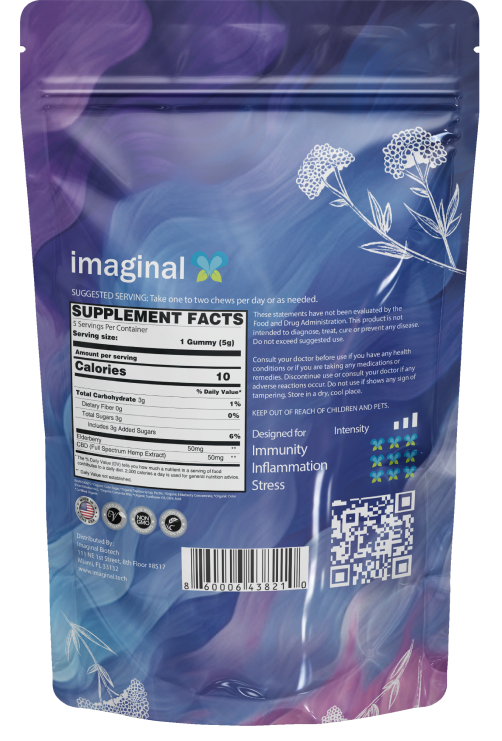By now, you've probably heard about CBD, the wellness product that has taken the world by storm. It’s not an exaggeration to say that it’s perhaps the most popular wellness product of the 21st century. If you are not familiar with CBD, it's short for cannabidiol, one of the major compounds of the hemp plant. One of the reasons why CBD is popular is because it doesn't produce an intoxicating effect, unlike THC, another primary cannabis compound.

Another reason why CBD has become popular is because of its versatility. Different people claim that it helps them with different things. Some people claim that it helps them stay calm while others claim that it reduces their stress levels.
However, the most popular claim is that using CBD will help you sleep better.
The belief that CBD helps with sleep is common among everyday folks and celebrities alike. Megan Rapinoe, Alessandra Ambrosio, and Michael J Fox are some of the stars who claim that they use CBD for sleep.
But is there any truth to this belief? Will CBD help you sleep? What does science say?
Let’s find out.
What Is Sleep?

While this might seem like an obvious question, we need to understand the basics of sleep before we look at how CBD affects it.
Wikipedia defines sleep as a naturally recurring state of mind and body. It is characterized by altered consciousness, relatively inhibited sensory activity, reduced muscle activity, and inhibition of nearly all voluntary muscles during rapid eye movement (REM) sleep.
What this means is that when you are asleep, your body is in its most relaxed state. Your sense organs have taken a break, and you are less likely to respond to external stimuli.
How Do We Fall Asleep?
Have you ever wondered how you fall asleep? What happens from the time you get into bed to when you finally fall asleep? If you have found yourself losing sleep over this question, don't worry, you aren't the only one. Researchers all over the world have been trying to answer this question.
One of the most promising research papers on the subject was written in 2011 by a team of neuroscientists from Washington University in St. Louis. In the article, the researchers posited that when you are in the pre-sleep phase, your brain waves show alpha activity. Alpha activity is generally linked to quiet wakefulness.
According to Professor Linda Larson-Prior, one of the lead researchers on the team, “It is in this period that the brain progressively disengages from the external world.“
At some point, your body enters the transitional sleep stage.
What Do You Mean? Are There Stages of Sleep?
Yes, according to researchers, we sleep in stages; the Non-REM stage of sleep and REM sleep. REM is short for rapid eye movement, during REM sleep your eyes move rapidly in multiple directions
When you transition from wakefulness to sleep, you first experience non-REM sleep and then REM sleep. You will cycle between these two phases until you wake up.
You can check out this guide on different stages of sleep.
What Makes It Hard to Fall Asleep?

Now that we know a little bit more about sleep let’s look at a question that keeps a lot of people up at night. Why can’t I fall asleep?
If you have difficulties falling asleep, don't worry, you're not alone. According to a recent study by Consumer Report, 27% of adults have trouble sleeping or staying asleep most nights. The study also found that 68% of adults had trouble sleeping at least once a week.
Both findings are shocking, to say the least, and it raises the question of why do people struggle to fall asleep?
According to experts, adults may have difficulties sleeping because of the following reasons:
- Aging
- An uncomfortable sleep environment
- Too many stimulating activities before bedtime e.g., exercising, playing video games or watching the TV)
- Physical pain
- Stress
- Anxiety
- Jet Lag
- The effect of some medication
Some people might have trouble sleeping because of sleep disorders such as sleep apnea, restless leg syndrome, and insomnia.
Side Effects of Not Getting Enough Sleep

Sleep is essential because it gives your body time to rest and recover from the rigors of your daily schedule. If you don’t get enough sleep, you might experience the following side effects:
- Memory issues
- Weakened immunity
- Weight gain
- High blood pressure
- Cognitive impairment
- Increased risk of heart disease
- Increased risk of diabetes
I don’t know about you, but I’m going to get eight hours of sleep tonight.
What Does All This Have to Do with CBD?
The side effects of not getting enough sleep are scary, and because of this, people are constantly trying to improve their quality of sleep. The most common way people do this is through sleep aids such as
- Medication- Prescription medication, over the counter medicines and herbal remedies
- Sleep Laboratories
- Pillows and mattresses
- Sleep apnea devices
These sleep aids are popular because they have proven effective over the years, but if recent anecdotal evidence is anything to go by, they might lose their spot to CBD.
Over the past few years, we have seen an increase in the number of people using CBD to improve their sleep. There have been numerous articles and lots of claims on social media about the efficacy of using CBD for sleep. But all this is anecdotal evidence. Is there any research that supports using CBD for sleep?
Research on CBD and sleep
Chagas MH et al.
One of the most recent studies on CBD and sleep was carried out in 2013 by a group led by Chagas MH. In the study, the researchers had a group of adult male Wistar rats. They divided the rats into four groups and gave three groups differing amounts of CBD and one group a vehicle.
Note: In the world of research, a vehicle refers to an innocuous substance that is used to deliver the experimental compound to the test subject. For example, if researchers want to test the effectiveness of drug X, they can choose to deliver it through a saline solution. In this case, the saline solution is the vehicle.
In this type of control, the researchers give the test subject the vehicle without any of the test compounds to see if the vehicle affects the patient. Now let’s get back to the research.
In the 2013 study, the first group was given 2.5 mg of CBD per kg of body weight. The second group was given 10mg of CBD per kg, and the third group was given 40mg/kg.
When the study ended, the scientists found that the rats that had been given CBD slept for longer. The study also found that CBD increased sleep latency in the light period of the day.
Note: Sleep latency is the amount of time it takes a person to fall asleep after the lights have been switched off.
Dr. Katherine Belendiuk et al.
Another study on CBD and sleep was carried out by a team led by Dr. Katherine Belendiuk. In this study, the researchers were interested in finding out what cannabis type and cannabinoid concentration people who had trouble falling asleep preferred.
The researchers recruited 163 adults who use medical cannabis for physical or mental conditions. They then asked them to provide data on the following:
- Whether the marijuana was supposed to help them with sleep issues such as nightmares and insomnia
- Their sleep quality according to The Pittsburgh Sleep Quality Index (PSQI)
- Marijuana use including their ideal type
- Any symptoms of DSM-5 cannabis dependence
Eighty-one participants of the study reported that they used marijuana to control insomnia. Fourteen reported that they used it to reduce the number of nightmares they experienced.
During the study, individuals who had insomnia were more likely to use cannabis with a high concentration of CBD. While this might be a positive sign of the impact CBD has on insomnia, the researchers suggested that more controlled studies are needed.
Dr. Scott Shannon et al.
One of the most famous studies on CBD and sleep was carried out by a team led by Dr. Scott Shannon. The researchers wanted to find out if CBD could have an impact on anxiety and improve sleep.
For this study, the researchers performed a retrospective review of patients at a psychiatric clinic. The patients were given CBD for sleep and anxiety as an adjunct to their regular treatment. The researchers then studied the monthly anxiety and sleep reports of the patients.
The final results of the study were drawn from 72 patients. For 47 of these patients, anxiety was their primary concern; for the remaining 25, poor sleep was their main concern.
Within the first month of the study, anxiety scores for 57 patients decreased, and it remained decreased for the entire length of the study. The sleep scores of 48 patients improved during the first month, but they varied over the course of the study.
Although these results might seem promising, the researchers stated that more controlled clinical studies are needed to fully understand the effects of CBD on sleep.
What about Melatonin?

Another sleep aid that has been making waves recently is melatonin. Melatonin is a hormone produced by the body in the pineal gland. It aids the body in knowing when to sleep and when to wake up.
The amount of melatonin our body produces is dependent on the time of day, the amount of light we get each day, and our bodies' circadian clocks. When the sun sets, the amount of melatonin in our body increases, and it decreases after the sun has risen.

When eyes receive light from the sun, the pineal gland's production of melatonin is inhibited and the hormones produced keep the human awake. When the eyes do not receive light, melatonin is produced in the pineal gland and the human becomes tired. (Created by Srruhh for wikimedia commons)
People take melatonin supplements to help them deal with sleep disorders such as insomnia, delayed sleep phase disorder, and sleep work disorder. Scientists are also trying to find out whether melatonin can help with the following conditions:
- Cancer
- Alzheimer’s disease
- High blood pressure at night
- Amyotrophic lateral sclerosis (ALS)
- Sleeping difficulties for children on the autism spectrum
Melatonin has proven effective in a lot of cases, and the best part about it is that it’s produced in our bodies.
What Happens When You Combine CBD with Melatonin?
Imaginal CBD Sleep Formula Melatonin softgels
When you combine CBD with melatonin, you get our proprietary CBD SoftGels with melatonin. Each SoftGel has been uniquely crafted using our water-soluble nanoemulsion technology to contain the right mix of CBD and melatonin to promote healthy sleep and relaxation.
If you would like to try them out, you can visit our shop by clicking here. And if you enjoyed this article, please share it with your friends and family so that they too can learn about CBD and sleep.




